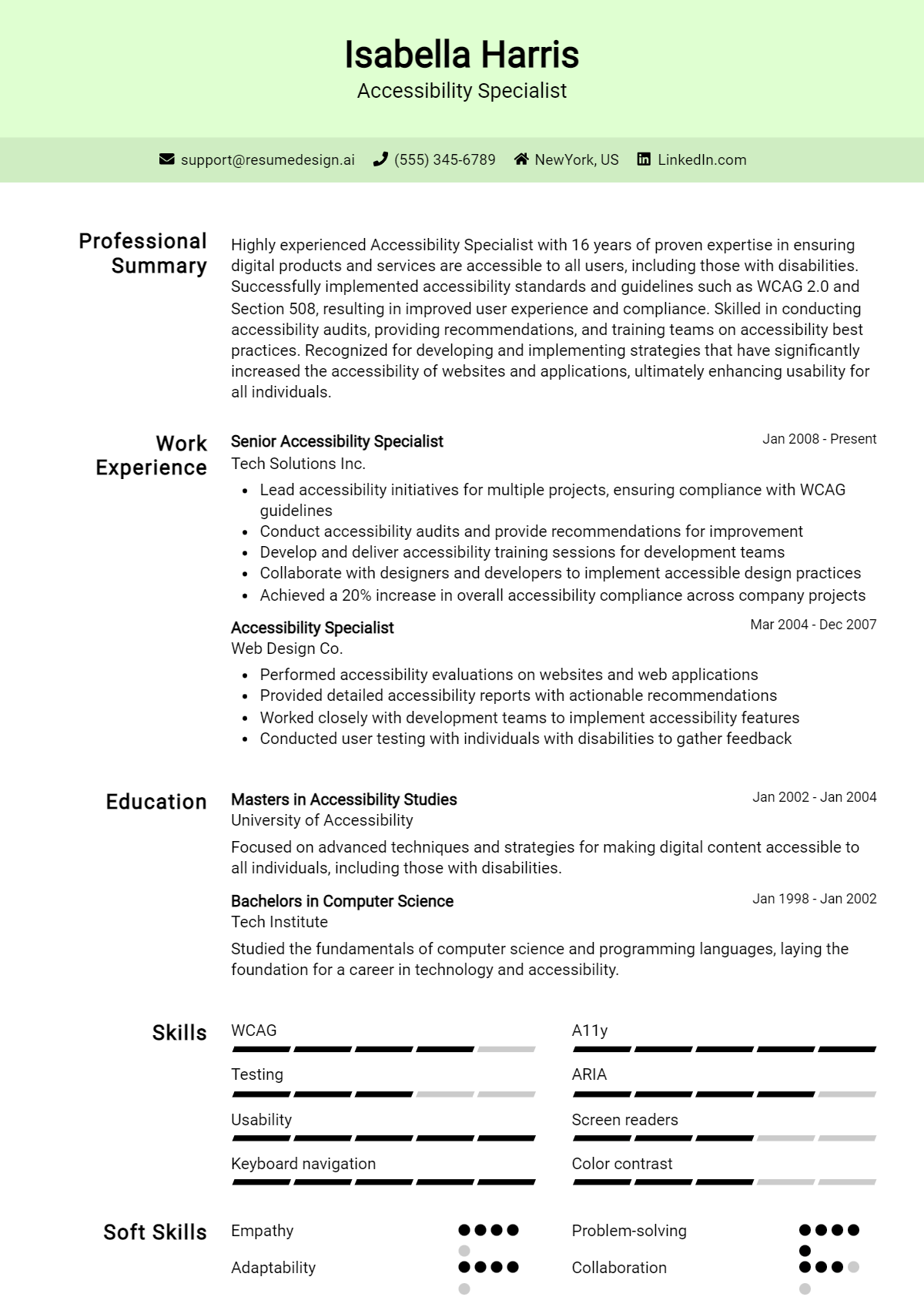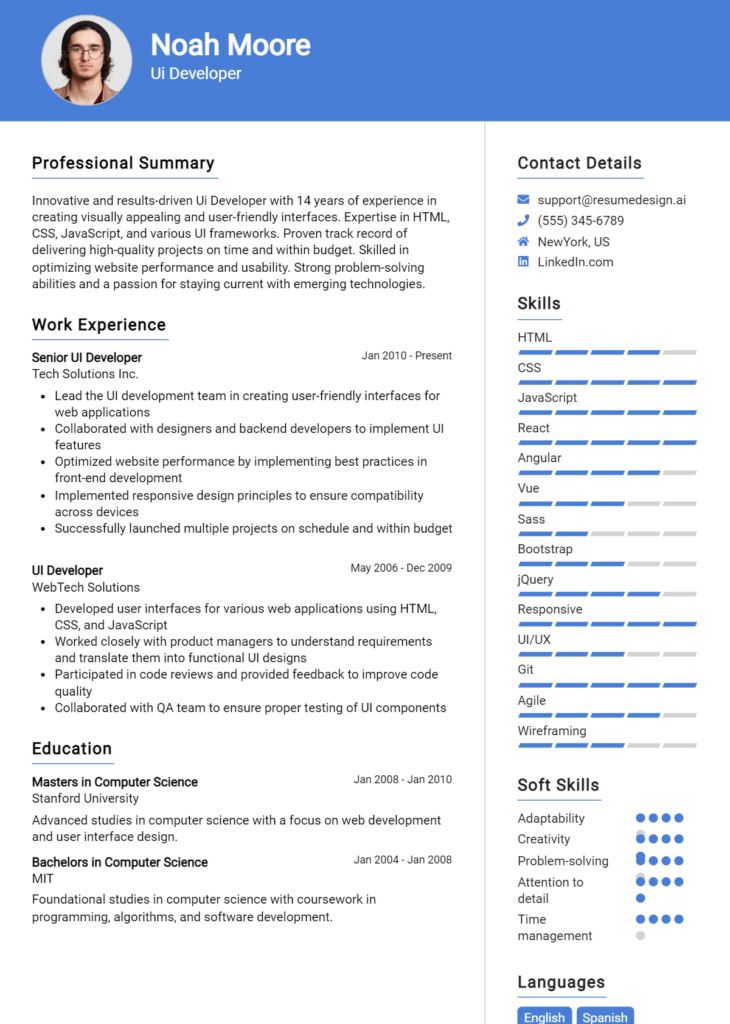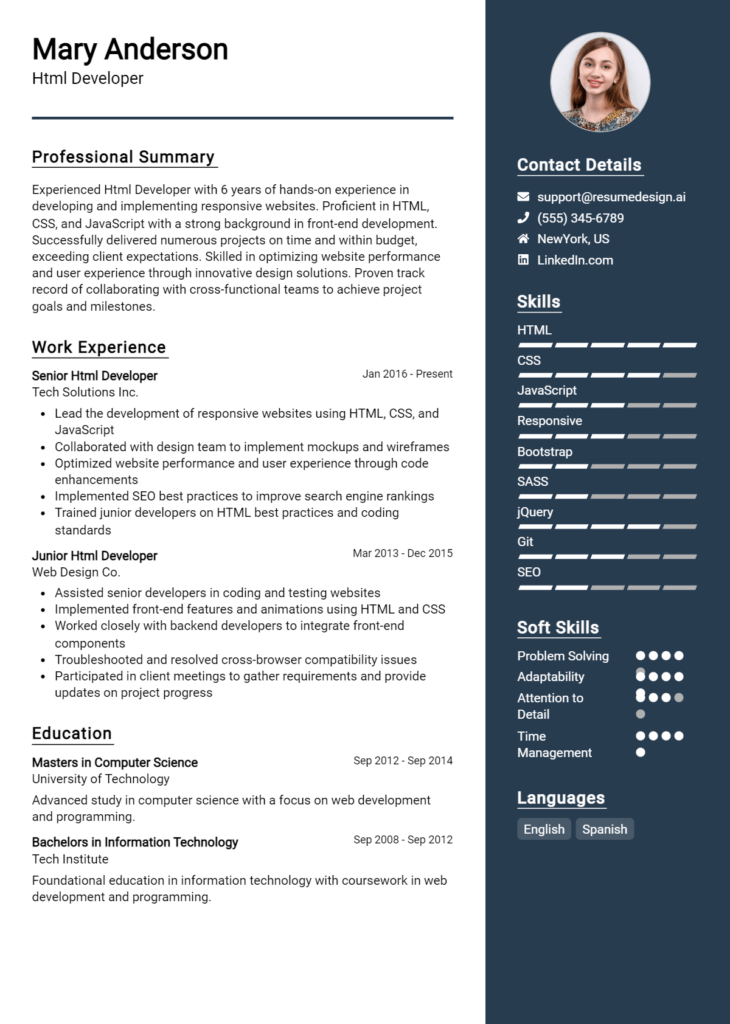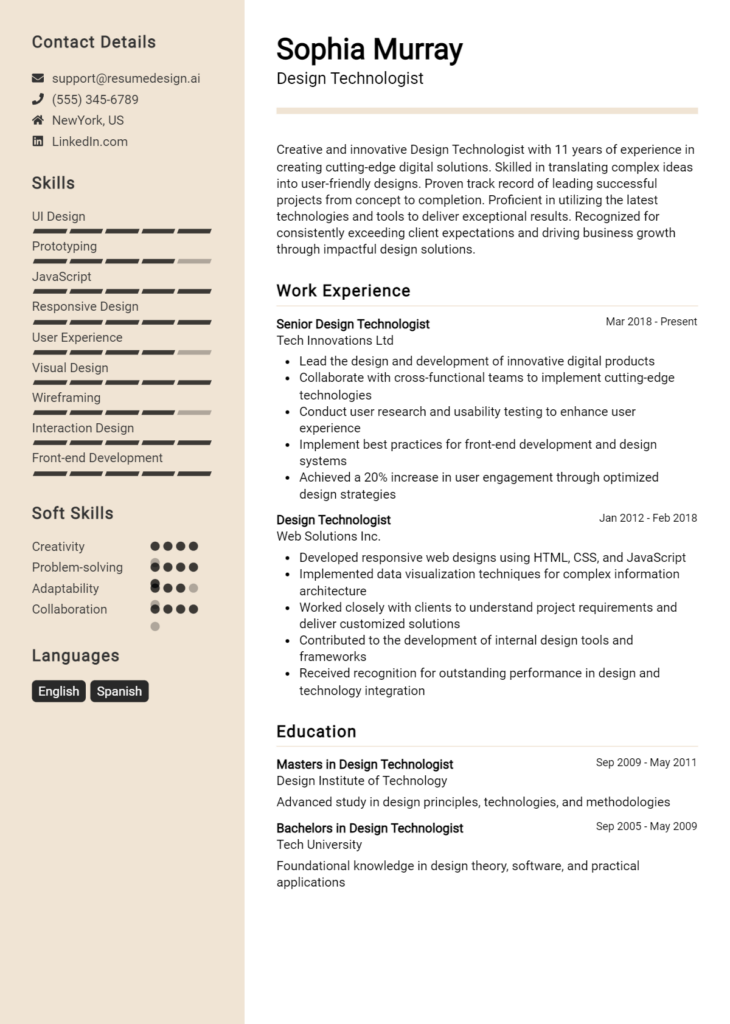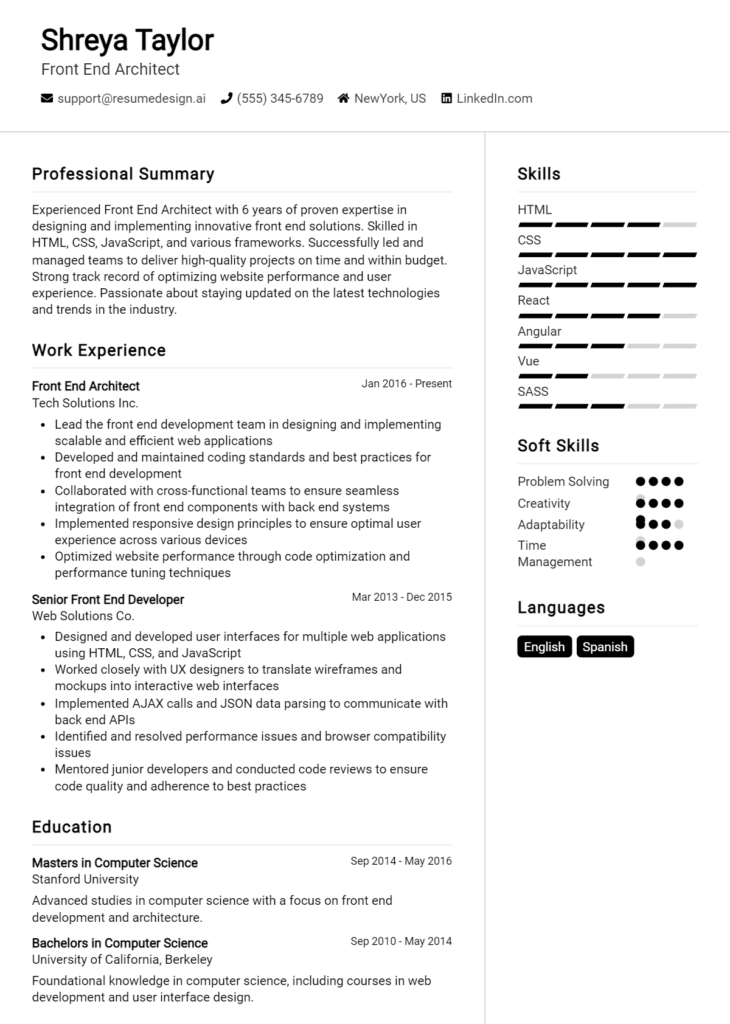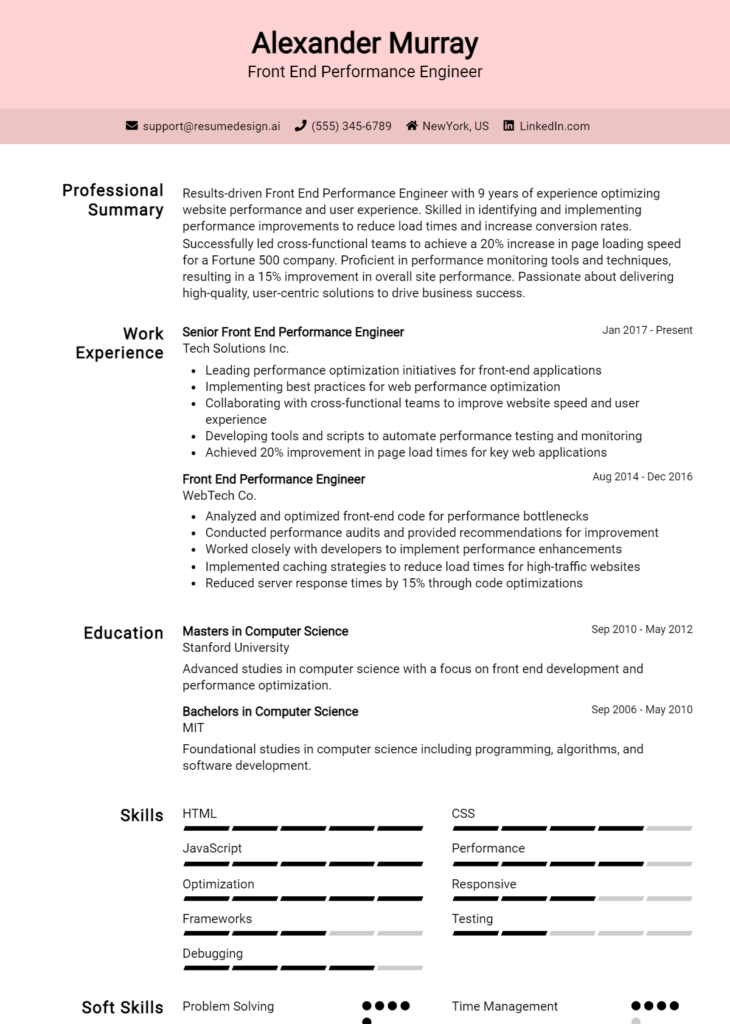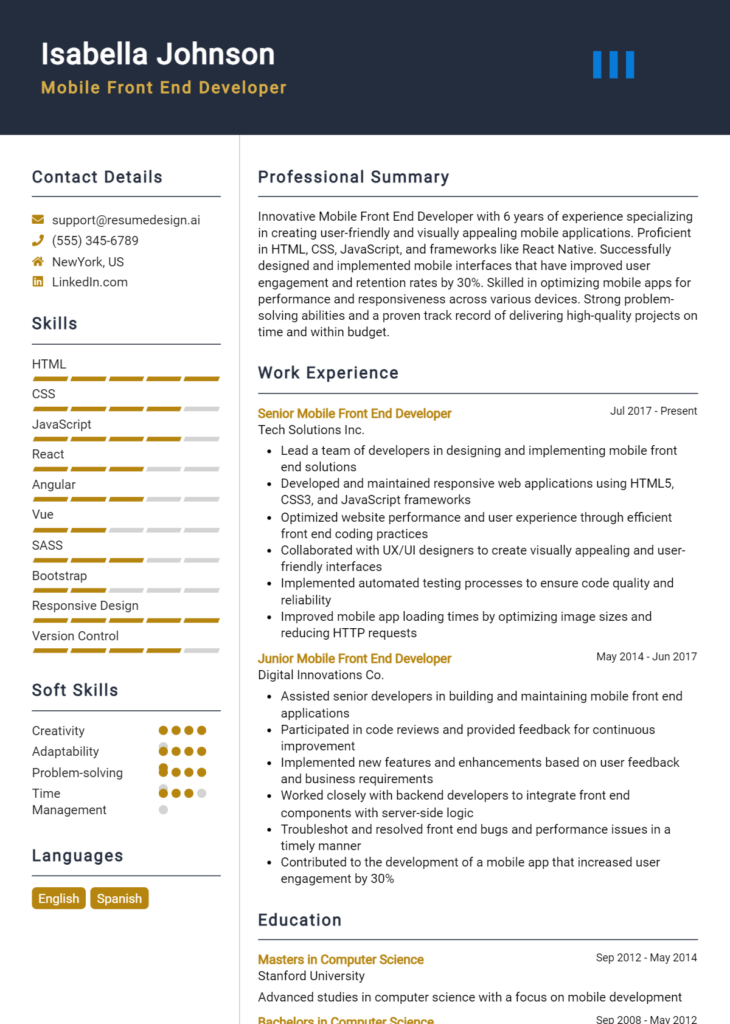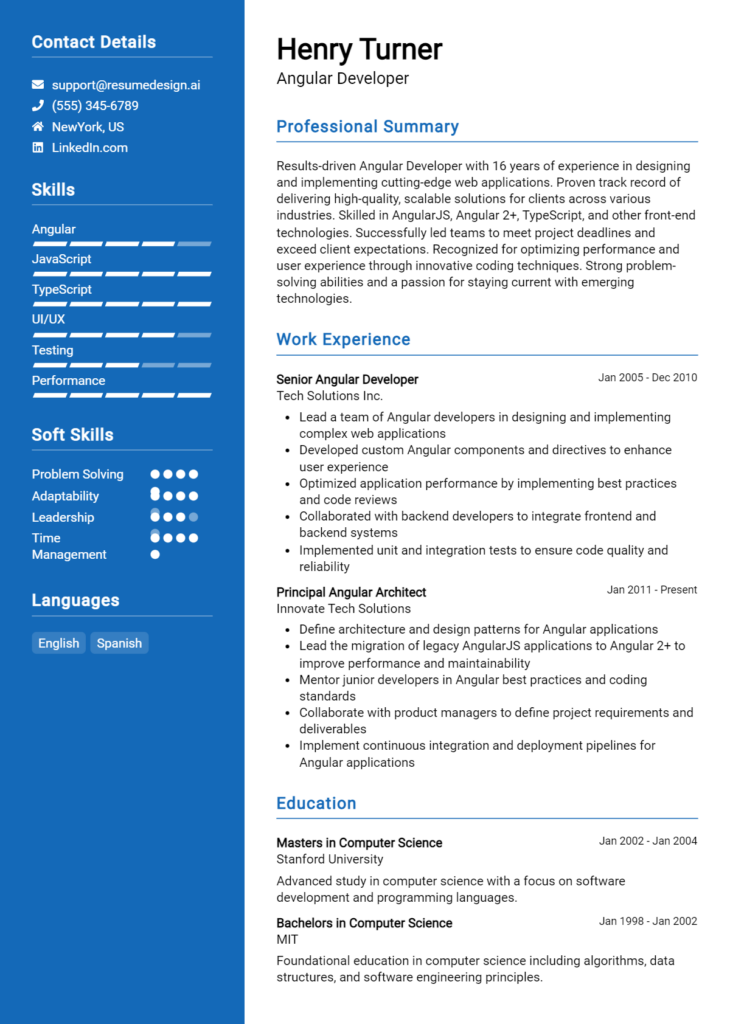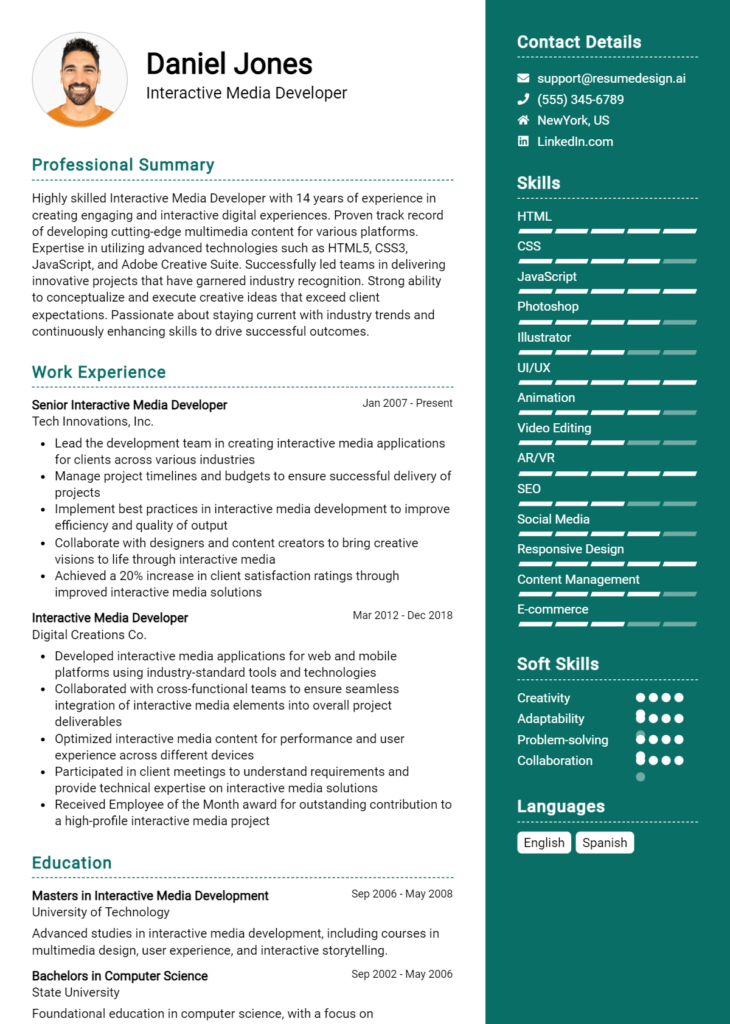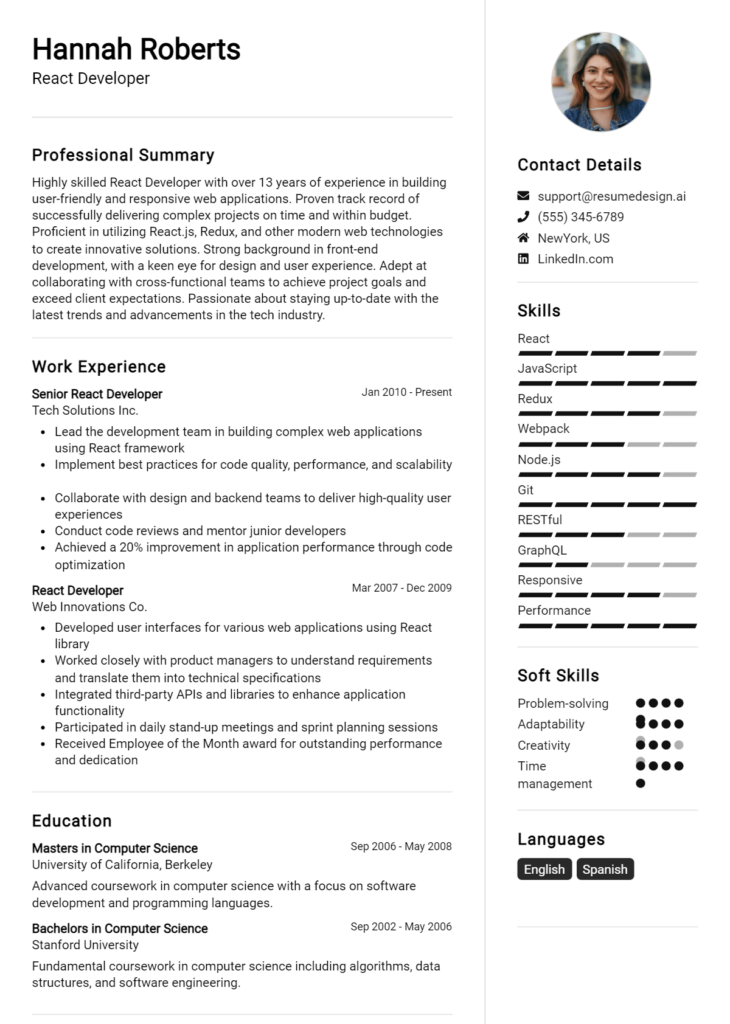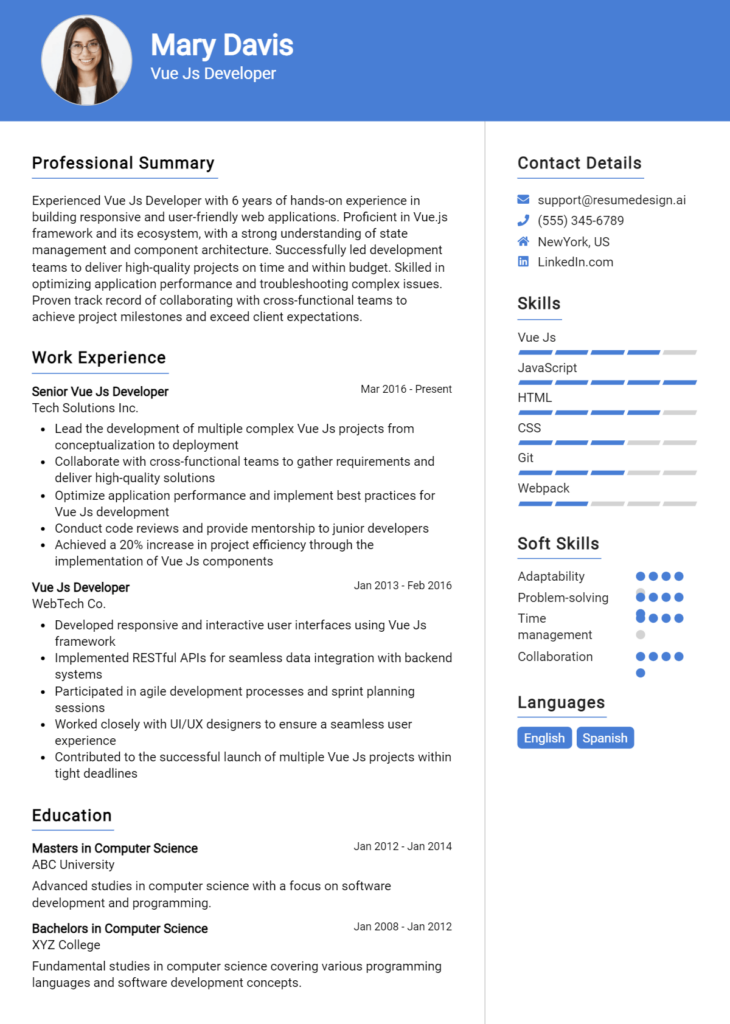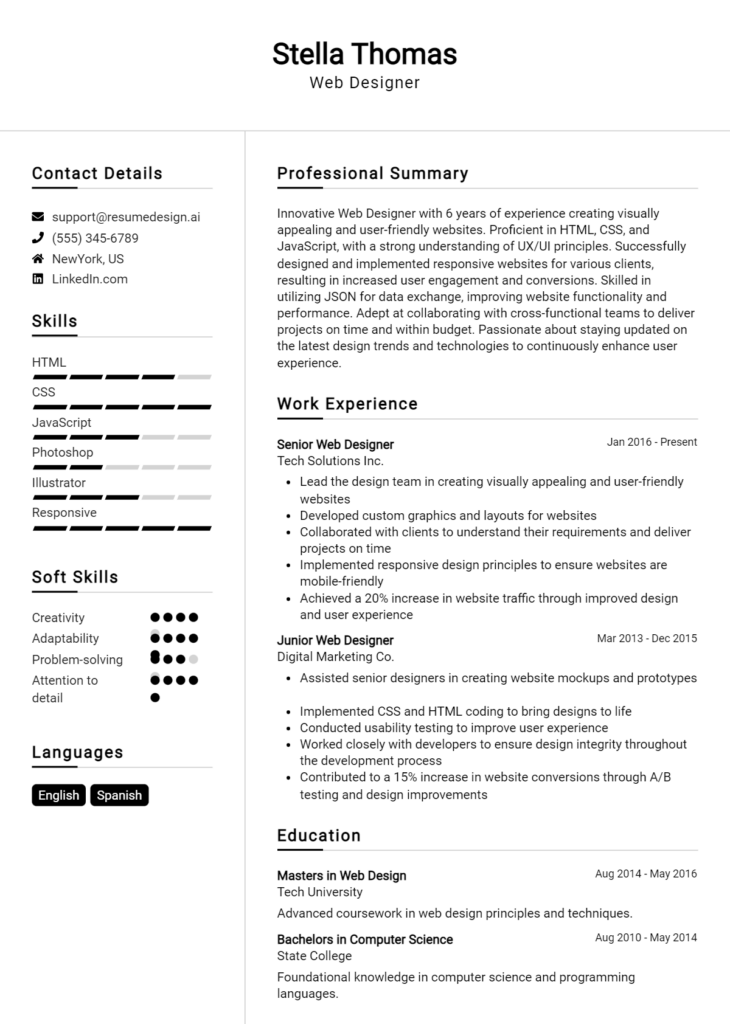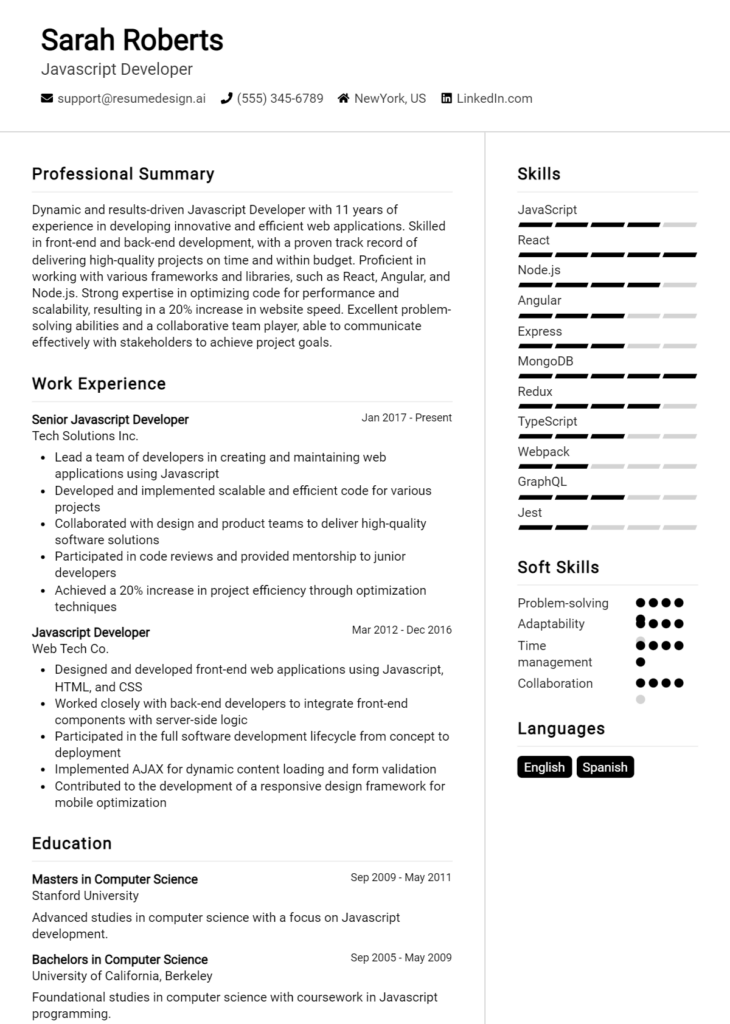Accessibility Specialist Core Responsibilities
An Accessibility Specialist plays a crucial role in ensuring that digital products and services are usable by individuals with disabilities. Key responsibilities include conducting accessibility audits, developing accessibility guidelines, and collaborating with design, development, and content teams to implement solutions. Essential skills include technical proficiency in accessibility standards (like WCAG), operational insight to manage projects, and strong problem-solving capabilities to address barriers. These competencies not only enhance user experience but also align with the organization's commitment to inclusivity. A well-crafted resume can effectively highlight these qualifications, showcasing the specialist's ability to bridge various functions and contribute to overarching business objectives.
Common Responsibilities Listed on Accessibility Specialist Resume
- Conduct accessibility audits and assessments of digital products.
- Develop and implement accessibility guidelines and best practices.
- Provide training and support to staff on accessibility standards.
- Collaborate with cross-functional teams to enhance product accessibility.
- Test websites and applications for compliance with accessibility standards.
- Document and report on accessibility issues and solutions.
- Advise on the procurement of accessible technologies and tools.
- Stay updated on legislation and trends related to accessibility.
- Engage with users to gather feedback on accessibility experiences.
- Assist in creating accessible content and materials.
- Promote an inclusive culture within the organization.
High-Level Resume Tips for Accessibility Specialist Professionals
In today's competitive job market, a well-crafted resume is crucial for Accessibility Specialist professionals seeking to make a lasting impression on potential employers. As the first point of contact, your resume serves not only as a summary of your qualifications but also as a reflection of your expertise and commitment to accessibility. It should effectively highlight your skills, achievements, and relevant experiences that demonstrate your ability to create inclusive environments for all users. This guide will offer practical and actionable resume tips specifically tailored for Accessibility Specialist professionals, ensuring that your application stands out and resonates with hiring managers.
Top Resume Tips for Accessibility Specialist Professionals
- Tailor your resume to the specific job description, incorporating keywords and phrases that align with the role.
- Showcase relevant experience, including internships, volunteer work, or projects that demonstrate your accessibility knowledge.
- Quantify your achievements by using metrics to illustrate the impact of your work, such as increased user engagement or improved compliance rates.
- Highlight industry-specific skills, including knowledge of WCAG guidelines, assistive technologies, and accessible design principles.
- Include certifications relevant to accessibility, such as Certified Professional in Accessibility Core Competencies (CPACC) or Web Accessibility Specialist (WAS).
- Utilize a clean, organized format that enhances readability and ensures that important information is easily accessible.
- Incorporate a summary statement that encapsulates your passion for accessibility and your unique value proposition as a candidate.
- Use action verbs to describe your responsibilities and contributions, making your bullet points more dynamic and compelling.
- Keep your resume to a maximum of two pages, focusing on the most relevant and recent experiences to maintain clarity.
By implementing these tips, you can significantly enhance the effectiveness of your resume, increasing your chances of landing a job in the Accessibility Specialist field. A well-structured and tailored resume not only showcases your qualifications but also highlights your dedication to creating accessible environments, making you a strong candidate in this vital profession.
Why Resume Headlines & Titles are Important for Accessibility Specialist
In the competitive field of accessibility, having a well-crafted resume headline or title is critical for an Accessibility Specialist. A strong headline serves as the first impression for hiring managers, providing an immediate summary of a candidate’s key qualifications and expertise in just a few impactful words. It should be concise, relevant, and directly related to the job being applied for, allowing candidates to stand out and capture attention amidst a sea of applicants. A compelling resume title can effectively communicate a candidate's value proposition, showcasing their commitment to creating inclusive environments and enhancing user experience for individuals with disabilities.
Best Practices for Crafting Resume Headlines for Accessibility Specialist
- Keep it concise: Aim for one to two impactful phrases.
- Be role-specific: Tailor your headline to reflect the specific position you are applying for.
- Highlight key skills: Include relevant skills that align with the job description.
- Use action words: Employ strong verbs to convey your contributions and impact.
- Showcase achievements: Incorporate notable accomplishments to establish credibility.
- Avoid jargon: Use clear language that is easily understood by a broad audience.
- Reflect your passion: Convey your commitment to accessibility and inclusivity.
- Test for clarity: Ensure your headline is straightforward and leaves no room for ambiguity.
Example Resume Headlines for Accessibility Specialist
Strong Resume Headlines
“Certified Accessibility Specialist Committed to Enhancing User Experience”
“Accessibility Advocate with 5+ Years of Experience in UX Design”
“Expert in ADA Compliance and Inclusive Design Strategies”
“Innovative Accessibility Specialist Focused on Digital Inclusion”
Weak Resume Headlines
“Looking for a Job in Accessibility”
“Accessibility Specialist Seeking Opportunities”
The strong headlines are effective because they clearly convey the candidate’s expertise, relevant experience, and commitment to the field of accessibility. They utilize specific language that resonates with hiring managers, making a memorable impression. In contrast, the weak headlines fail to impress due to their vagueness and lack of specific qualifications. They do not differentiate the candidate or highlight their unique strengths, making it difficult for hiring managers to see their potential value in a competitive job market.
Writing an Exceptional Accessibility Specialist Resume Summary
Crafting an exceptional resume summary is crucial for an Accessibility Specialist, as it serves as the first impression for hiring managers. A well-written summary quickly captures attention by clearly showcasing the candidate's key skills, relevant experience, and significant accomplishments in the field of accessibility. By providing a concise and impactful overview, the summary not only highlights the applicant's qualifications but also demonstrates their understanding of the specific job they are applying for. This tailored approach can greatly enhance the chances of advancing to the interview stage.
Best Practices for Writing a Accessibility Specialist Resume Summary
- Quantify Achievements: Use numbers and metrics to demonstrate the impact of your work, such as improved accessibility scores or user satisfaction ratings.
- Focus on Relevant Skills: Highlight specific skills related to accessibility, such as knowledge of WCAG guidelines, assistive technologies, or user experience research.
- Tailor to the Job Description: Customize your summary to align with the specific role and organization you are applying for, using keywords from the job posting.
- Be Concise: Keep your summary brief, ideally within 2-4 sentences, ensuring every word adds value.
- Showcase Accomplishments: Mention notable projects or initiatives you've led that resulted in significant improvements in accessibility.
- Use Action Verbs: Start sentences with strong action verbs to convey your achievements and responsibilities dynamically.
- Highlight Collaboration: If applicable, mention your experience working with cross-functional teams to improve accessibility, showcasing your ability to communicate effectively.
- Maintain a Professional Tone: Ensure that your language is professional and reflects your expertise in the field.
Example Accessibility Specialist Resume Summaries
Strong Resume Summaries
Results-driven Accessibility Specialist with over 5 years of experience enhancing digital accessibility for over 200,000 users. Successfully improved WCAG compliance from Level AA to AAA across multiple platforms, leading to a 30% increase in user satisfaction ratings.
Dedicated Accessibility Specialist skilled in implementing assistive technology solutions and conducting comprehensive audits, contributing to a 40% reduction in user-reported issues. Proven ability to collaborate with development teams to integrate accessibility features seamlessly.
Innovative Accessibility Specialist with a background in UX design, achieving a 50% improvement in website accessibility scores through targeted user testing and redesign initiatives. Expertise in training stakeholders on accessibility best practices.
Weak Resume Summaries
Experienced professional looking for a job in accessibility. I have worked in various roles and have some knowledge about accessibility standards.
Accessibility Specialist with some experience in the field. I am committed to helping make things better for everyone.
The strong resume summaries are considered effective because they provide quantifiable results, specific skills relevant to the accessibility role, and demonstrate the candidate's direct contributions to enhancing accessibility. In contrast, the weak summaries lack detail, are overly generic, and fail to articulate measurable outcomes or relevant expertise, making it difficult for hiring managers to gauge the candidate's suitability for the role.
Work Experience Section for Accessibility Specialist Resume
The work experience section of an Accessibility Specialist resume is critical as it serves as a testament to the candidate's practical skills and their ability to contribute effectively to an organization. This section not only highlights the technical expertise required to implement accessibility standards and tools but also showcases the individual's capacity to manage teams and deliver high-quality products that meet industry standards. It is essential for candidates to quantify their achievements, offering concrete evidence of their impact, as this strengthens their case for being a qualified professional in the accessibility field.
Best Practices for Accessibility Specialist Work Experience
- Highlight specific technical skills relevant to accessibility, such as familiarity with WCAG guidelines and assistive technologies.
- Quantify achievements with percentages, numbers, or specific outcomes to demonstrate the impact of your work.
- Showcase collaboration with cross-functional teams, emphasizing communication and teamwork skills.
- Include experience with user testing and feedback processes to illustrate user-centered design practices.
- Detail management roles or leadership experiences that contributed to successful accessibility initiatives.
- Align your experience with industry standards and best practices to show familiarity with the field.
- Use action verbs to convey your contributions clearly and effectively.
- Keep descriptions concise and focused on results to maintain clarity and impact.
Example Work Experiences for Accessibility Specialist
Strong Experiences
- Led a project that revamped the company website to be compliant with WCAG 2.1, resulting in a 40% increase in accessibility scores and improved user satisfaction ratings.
- Managed a cross-functional team of developers and designers to implement an accessibility-first design approach, reducing user-reported issues by 50% within the first quarter.
- Conducted comprehensive accessibility audits for three major products, providing actionable recommendations that improved compliance by 30% within six months.
- Facilitated workshops on accessibility best practices, enhancing team knowledge and resulting in a 25% reduction in design errors related to accessibility.
Weak Experiences
- Worked on various projects related to accessibility without specific outcomes or metrics provided.
- Assisted team members with accessibility tasks, but did not lead or implement any major changes.
- Participated in meetings discussing accessibility, but failed to contribute any substantial ideas or solutions.
- Gained experience in accessibility tools without detailing specific tools or the impact of their use.
The examples provided are considered strong because they include specific, measurable outcomes and demonstrate leadership and collaboration within projects. These experiences clearly articulate the candidate's direct contributions to improving accessibility and show a proactive approach to problem-solving. In contrast, the weak experiences lack specificity, quantifiable results, and clear indications of impact, making them less compelling to potential employers. Without concrete achievements or leadership roles, these statements fail to demonstrate the candidate's true capabilities in the field of accessibility.
Education and Certifications Section for Accessibility Specialist Resume
The education and certifications section of an Accessibility Specialist resume plays a crucial role in demonstrating the candidate's academic qualifications and commitment to maintaining industry standards. This section not only showcases relevant degrees and certifications but also highlights the individual's dedication to continuous learning and professional development. By providing details about pertinent coursework, specialized training, and recognized credentials, candidates can significantly enhance their credibility and alignment with the specific requirements of the Accessibility Specialist role, making them stand out to potential employers.
Best Practices for Accessibility Specialist Education and Certifications
- Include relevant degrees in fields like Human-Computer Interaction, Accessibility, or Information Technology.
- List industry-recognized certifications, such as Certified Professional in Accessibility Core Competencies (CPACC) or Web Accessibility Specialist (WAS).
- Highlight specialized training programs that focus on accessibility tools and techniques.
- Provide specific coursework that pertains to accessibility standards, usability, and assistive technologies.
- Ensure that the information is up-to-date, reflecting the latest trends and practices in accessibility.
- Use clear formatting to make the section easily readable, with consistent bullet points and organization.
- Emphasize any continuing education or workshops that demonstrate ongoing professional development.
- Tailor the section to the job description, focusing on qualifications that align with the employer's needs.
Example Education and Certifications for Accessibility Specialist
Strong Examples
- Bachelor of Science in Human-Computer Interaction, University of XYZ, 2022
- Certified Professional in Accessibility Core Competencies (CPACC), International Association of Accessibility Professionals, 2023
- Web Accessibility Specialist (WAS), Web Accessibility Initiative, 2022
- Coursework in Usability Testing and Assistive Technology, University of XYZ, 2021
Weak Examples
- Bachelor of Arts in History, University of ABC, 2015
- Certification in Microsoft Office Suite, 2018
- Online course in Basic HTML, 2019
- High School Diploma, 2010
The strong examples are considered effective because they directly relate to the responsibilities and skills required for an Accessibility Specialist, showcasing relevant education and recognized certifications that demonstrate the candidate's expertise in the field. In contrast, the weak examples fail to establish a connection to accessibility, featuring outdated or irrelevant qualifications that do not support the candidate’s suitability for the role, thereby diminishing their appeal to potential employers.
Top Skills & Keywords for Accessibility Specialist Resume
In the rapidly evolving field of accessibility, the role of an Accessibility Specialist is critical in ensuring that digital and physical environments are inclusive for all individuals, including those with disabilities. A strong resume for an Accessibility Specialist must showcase a blend of both hard and soft skills that reflect the candidate's expertise and their ability to advocate for accessibility standards. Highlighting these skills not only demonstrates proficiency in technical aspects but also emphasizes essential interpersonal qualities that facilitate collaboration with diverse teams. A well-rounded resume can significantly enhance a candidate's chance of standing out in a competitive job market.
Top Hard & Soft Skills for Accessibility Specialist
Soft Skills
- Strong communication skills
- Empathy and understanding
- Problem-solving abilities
- Attention to detail
- Collaboration and teamwork
- Critical thinking
- Adaptability and flexibility
- Project management
- Advocacy for inclusivity
- Active listening
Hard Skills
- Knowledge of accessibility standards (WCAG, ADA)
- Proficiency in assistive technologies
- Experience with usability testing
- Familiarity with web development languages (HTML, CSS, JavaScript)
- Understanding of accessibility auditing tools
- Ability to conduct accessibility assessments
- Data analysis and reporting skills
- Experience with design software (Adobe Creative Suite, Sketch)
- Knowledge of content management systems (CMS)
- Familiarity with mobile accessibility guidelines
By focusing on these skills, candidates can effectively tailor their resumes to highlight their unique qualifications and experiences, ultimately leading to a more impactful application. Moreover, ensuring that your work experience aligns with these skills can further solidify your candidacy in this essential role.
Stand Out with a Winning Accessibility Specialist Cover Letter
I am writing to express my enthusiasm for the Accessibility Specialist position at [Company Name], as advertised on [Job Board/Company Website]. With a strong background in digital accessibility and a passion for creating inclusive experiences, I am excited about the opportunity to contribute to your team. My expertise includes working with the Web Content Accessibility Guidelines (WCAG) to ensure compliance and usability for all users, particularly those with disabilities. I believe that accessibility is not just a legal requirement, but a fundamental aspect of user experience that enhances engagement and fosters a diverse audience.
In my previous role at [Previous Company Name], I successfully led several accessibility audits and remediation projects that significantly improved the usability of our digital products. I collaborated with cross-functional teams, including designers and developers, to implement best practices in accessibility throughout the design and development lifecycle. My efforts resulted in a 30% increase in user satisfaction scores from individuals with disabilities, showcasing the measurable impact of our accessibility initiatives. Additionally, I have conducted training sessions for staff to raise awareness about the importance of accessibility, empowering them to integrate inclusive practices into their daily work.
I am particularly drawn to [Company Name] because of your commitment to innovation and inclusivity in technology. I admire your efforts to create products that are not only functional but also accessible to all users. I am eager to bring my skills in user testing, assistive technologies, and accessibility compliance to your team. I am confident that my proactive approach and dedication to improving user experiences will make a valuable contribution to your ongoing accessibility initiatives.
Thank you for considering my application. I look forward to the possibility of discussing how my background and skills align with the goals of [Company Name]. I am excited about the opportunity to help drive accessibility efforts forward and ensure that your products are welcoming and usable for everyone.
Common Mistakes to Avoid in a Accessibility Specialist Resume
When crafting a resume as an Accessibility Specialist, it’s crucial to present your skills and experiences in a clear, concise, and effective manner. Many candidates make common mistakes that can hinder their chances of landing an interview. By avoiding these pitfalls, you can ensure that your resume stands out and accurately reflects your expertise in making digital environments accessible to all users. Here are some common mistakes to watch out for:
Neglecting to Tailor the Resume: Failing to customize your resume for each job application may result in a generic appearance that doesn’t highlight relevant skills. Tailoring your resume shows employers that you understand their specific needs and how your experience aligns with them.
Using Jargon Unnecessarily: While industry-specific terms are important, overloading your resume with jargon can make it less accessible to hiring managers who may not have a technical background. Strive for clarity and simplicity without sacrificing professionalism.
Lack of Quantifiable Achievements: Simply listing responsibilities without quantifying your accomplishments can make your contributions seem less impactful. Use metrics and specific examples to demonstrate the effectiveness of your work in improving accessibility.
Ignoring Soft Skills: Accessibility specialists often need to collaborate with diverse teams and communicate effectively with stakeholders. Neglecting to highlight your soft skills, such as empathy, communication, and problem-solving, can give an incomplete picture of your capabilities.
Failing to Include Relevant Certifications: Certifications related to accessibility, such as the Certified Professional in Accessibility Core Competencies (CPACC), should be prominently featured. Omitting these credentials can make it seem like you lack formal training in the field.
Poor Formatting and Layout: A cluttered or confusing resume layout can detract from the content. Ensure your resume is visually appealing, easy to read, and follows a logical structure that emphasizes key information.
Not Showcasing Portfolio Work: Accessibility specialists often have a portfolio of past projects that demonstrate their skills and effectiveness. Failing to provide links or references to your work can limit the ability of hiring managers to assess your expertise.
Overlooking Continuous Learning: The field of accessibility is constantly evolving. Not mentioning any ongoing education, workshops, or recent developments in your knowledge can make it appear that you are not keeping up with industry trends.
Conclusion
As we conclude our exploration of the Accessibility Specialist role, it's essential to highlight the importance of showcasing your unique skills and experiences effectively in your resume. Accessibility Specialists play a crucial role in ensuring that digital content is usable by everyone, including people with disabilities. Therefore, your resume should reflect your expertise in areas such as web accessibility standards (like WCAG), user testing, assistive technologies, and inclusive design practices.
In crafting your resume, consider emphasizing relevant certifications, practical experiences, and any projects that demonstrate your commitment to accessibility. Highlight your problem-solving abilities and your capacity to work collaboratively with diverse teams to foster inclusive environments.
To help you stand out in this competitive field, take advantage of available resources like resume templates, which can give your document a professional look. Additionally, a resume builder can simplify the process of creating a polished resume tailored to your skills. Don’t forget to review resume examples for inspiration on how to effectively present your qualifications.
Finally, consider enhancing your job application with a compelling cover letter template that articulates your passion for accessibility and your understanding of its impact on users.
Now is the time to ensure your resume reflects your capabilities and aligns with the demands of the Accessibility Specialist role. Take a moment to review and revise your resume today!

